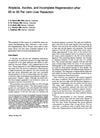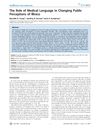14 citations,
September 2021 in “Journal of Inflammation Research” Alopecia areata patients, especially women with nail issues or atopic diseases, are at higher risk for other autoimmune diseases.
13 citations,
September 2009 in “Heart & Lung” Kawasaki's disease can occur in adults and should be considered with specific symptoms and high ferritin levels.
2 citations,
December 2022 in “The Journal of Dermatology” Patients with hidradenitis suppurativa have higher levels of cell-free DNA in their blood.
 2 citations,
August 2023 in “Pharmaceutics”
2 citations,
August 2023 in “Pharmaceutics” New skin disease treatments using TDDS are improving but face challenges like side effects and high costs.
1 citations,
February 2024 in “Pharmaceutics” Nanovesicles improve drug delivery through the skin, offering better treatment outcomes and fewer side effects.
 1 citations,
April 2023 in “International Journal of Molecular Sciences”
1 citations,
April 2023 in “International Journal of Molecular Sciences” New CRISPR/Cas9 variants and nanotechnology-based delivery methods are improving cancer treatment, but choosing the best variant and overcoming certain limitations remain challenges.
1 citations,
May 2024 in “International Journal of Molecular Sciences” Adenosine receptors could be promising targets for treating inflammatory skin diseases like psoriasis.
April 2024 in “Cosmetics” Wigs help improve self-esteem and quality of life for people with hair loss from alopecia areata.
 September 2023 in “Journal of Natural Fibers”
September 2023 in “Journal of Natural Fibers” Drying hair with a microfiber towel better maintains hair strength and structure than using a cotton towel or blow-drier.
 July 2023 in “International Journal of Endocrinology”
July 2023 in “International Journal of Endocrinology” Centratherum anthelminticum seed extract effectively treats Polycystic Ovary Syndrome in rats.
 January 2023 in “Open journal of pediatrics”
January 2023 in “Open journal of pediatrics” A 7-month-old girl with a rare skin disorder died because diagnosis was delayed.

A new minoxidil regimen improved hair loss in a lupus patient.

New treatments for hair loss should target eight main causes and use specific plant compounds and peptides for better results.
15 citations,
July 1998 in “Acta Dermato Venereologica” A gluten-free diet does not help hair regrowth in celiac disease patients with alopecia areata.
 May 2024 in “Our Dermatology Online”
May 2024 in “Our Dermatology Online” Excessive hair loss can be an early sign of celiac disease.
 April 2023 in “JAAD international”
April 2023 in “JAAD international” Patients with Frontal fibrosing alopecia in Morocco often have skin conditions and thyroid disorders.
 April 2016 in “Journal of The American Academy of Dermatology”
April 2016 in “Journal of The American Academy of Dermatology” People with Down syndrome are more likely to experience hair loss, and using dermoscopy can help diagnose it.
 May 2022 in “Rossijskij žurnal kožnyh i veneričeskih boleznej”
May 2022 in “Rossijskij žurnal kožnyh i veneričeskih boleznej” Alopecia areata is complex, often recurring, and needs personalized treatment, especially with other health issues.
 71 citations,
May 1975 in “The American journal of surgery”
71 citations,
May 1975 in “The American journal of surgery” The patient's liver did not fully grow back and she had serious temporary side effects after a very large liver surgery.
 January 2015 in “British journal of medicine and medical research”
January 2015 in “British journal of medicine and medical research” A woman with severe hair loss due to systemic sclerosis regrew her hair in 4 months using a combination of treatments.
 510 citations,
August 2006 in “Endocrinology”
510 citations,
August 2006 in “Endocrinology” The vitamin D receptor is involved in multiple body functions beyond calcium regulation, including immune response and rapid reactions not related to gene activity.
 73 citations,
May 1976 in “JAMA”
73 citations,
May 1976 in “JAMA” Long-term parenteral nutrition without zinc can cause severe zinc deficiency.
 50 citations,
March 2000 in “American Journal of Clinical Dermatology”
50 citations,
March 2000 in “American Journal of Clinical Dermatology” Alopecia Areata has no guaranteed treatment for hair regrowth, but options like corticosteroids and minoxidil are used, with future research focusing on genetic and immune therapies.
 49 citations,
March 2017 in “Journal of the American Academy of Dermatology”
49 citations,
March 2017 in “Journal of the American Academy of Dermatology” Tofacitinib caused significant hair regrowth in adolescents with alopecia universalis who didn't respond to other treatments.
 47 citations,
June 2014 in “Journal of Dermatological Treatment”
47 citations,
June 2014 in “Journal of Dermatological Treatment” Most treatments for lichen planopilaris were found to be generally unsatisfactory.
 47 citations,
January 2013 in “Indian Journal of Dermatology, Venereology and Leprology”
47 citations,
January 2013 in “Indian Journal of Dermatology, Venereology and Leprology” Premature graying of hair may suggest health issues and currently lacks effective treatments.
 43 citations,
May 2011 in “Dermatologic Therapy”
43 citations,
May 2011 in “Dermatologic Therapy” Recognizing the different stages of alopecia areata is crucial for accurate diagnosis and treatment.
 43 citations,
December 2008 in “PLOS ONE”
43 citations,
December 2008 in “PLOS ONE” Medical terms make new health issues seem more serious but don't affect views on well-known conditions.
 39 citations,
November 2017 in “Journal of The American Academy of Dermatology”
39 citations,
November 2017 in “Journal of The American Academy of Dermatology” The document suggests using standardized methods to track and measure hair loss in alopecia areata, including patient self-assessment and a 50% improvement in specific scores as a treatment goal.
 28 citations,
December 2019 in “Skin appendage disorders”
28 citations,
December 2019 in “Skin appendage disorders” Some medications might reverse gray hair, especially those that reduce inflammation or stimulate pigment production, and vitamin B might help.






















